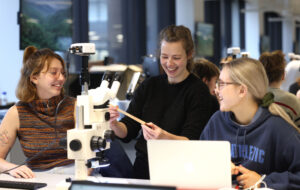Urban Planning
UCAS code K430
- Study mode
- Full-time
- Duration
- 3 years
- Start date and application deadlines
-
- Start date
UCAS code K430
The Urban Planning programme provides you with the knowledge and the skills to understand and help address the challenges faced by urban areas today. You’ll gain a rounded understanding of the factors and forces that are shaping the urban environment, the role that planning can play in developing and renewing urban areas, and reconciling competing and conflicting interests.
Attention is focused on approaches to planning for the urban environment in a rapidly changing world. An interdisciplinary approach to study provides learning opportunities that draw upon the expertise of academics in the Department of Geography and planning.
With major changes occurring in how we address transport infrastructure, housing and green belt development studying a degree in planning from the University of Liverpool provide the practical skills, as well as, the theoretical understanding required to balance the needs of urban and rural development.
You will develop a broad overview of how our towns, cities and regions have developed and have an opportunity to specialise in environmental or urban regeneration issues. With a pioneering approach to planning and regeneration, Liverpool is an ideal location in which to study town and regional planning. Over the past 30 years, Liverpool has been transformed economically, socially and environment. Staff and students from Planning at the University of Liverpool have been part of these changes as they have been observing, reflecting and helping local planners, developers and communities to shape these changes. This makes Liverpool an ideal urban laboratory to study how our world is changing.
Our unique three year BA (Hons) programme in Urban Planning is designed for those who wish to pursue a broad planning related degree with an environmental or urban orientated theme. You will gain an understanding of factors influencing the changing features and the ever-increasing demands of modern society.
Field trips
You will also have the opportunity to work with real practitioners as we work with local and international experts on projects and field trips. You are also encouraged to undertake internships or placements with planning agencies throughout your programme.
This programmes involves laboratory and fieldwork. The fieldwork is carried out in various locations, ranging from inner city to coastal and mountainous environments. We consider applications from disabled students on the same basis as to all other students, and reasonable adjustments will be considered to address barriers to access.

We’re proud to announce we’ve been awarded a Gold rating for educational excellence.
Discover what you'll learn, what you'll study, and how you'll be taught and assessed.
Your first year of study introduces you to planning issues and the circumstances in which they arise. It provides an understanding of how planning powers, agencies and policies work to overcome the challenges that face cities and communities. You will also improve your oral, written and visual communication skills and engage in group-based problem solving and practical work with local field days so you can put your newfound skills into practice in a real-life setting.
You will take the following compulsory modules and select two choices from the optional modules detailed below.
Programme details and modules listed are illustrative only and subject to change.
Year two is when you develop your specialism for either transforming cities and regions or spatial planning for environmental change. You will be introduced to the social, economic, and environmental causes of urban and regional change and the concept of environmental sustainability and its connections with patterns of human development. Project work helps you develop an awareness of the issues that arise in the development of planning schemes while a field trip examines social, economic and environmental planning challenges in a rural setting.
You will take the following compulsory modules.
Programme details and modules listed are illustrative only and subject to change.
Year three provides you with a more focused study of your specialism in order to gain greater knowledge and expertise of urban planning. You are required to take four modules associated with your specialism, made up of two core modules and two optional modules. You then choose a further four modules from a range of other optional modules. This could include a dissertation where you undertake a piece of independent research and international field class offering the opportunity to explore planning in a new context.
You will take the following compulsory modules and two additional optional modules that relate to your specialism – transforming cities and regions – and the remaining modules from the optional modules detailed below. You may be required to select a research module choice, for example dissertation.
| Compulsory modules | Credits |
|---|---|
| URBAN AND REGIONAL REGENERATION PROJECT (ENVS384) | 15 |
| URBAN AND REGIONAL REGENERATION (ENVS336) | 15 |
| INTERNATIONAL PLANNING STUDIES (ENVS378) | 30 |
Programme details and modules listed are illustrative only and subject to change.
Planning education has an important vocational focus and in Liverpool we consider a real world connection to be extremely important. Our students gain a broad understanding of planning, from the ways in which towns and cities have evolved and are being reshaped to meet the challenges of the 21st century to the effects of planning on the environment and planning’s role in urban regeneration.
To do this we have designed varied programmes of study with a range of teaching styles. You will learn by doing through place-based projects and field classes as well as be introduced to real-life examples from around the world.
Our programmes also include specialised training in geographic information systems, mapping and urban design. Together these approaches ensure that you gain valuable transferable skills whilst studying with us.
Assessments are designed around developing skills and styles of communication that will be relevant to future employers. So, in addition to exams and essays, you will also undertake assessments that include computer-based exercises, oral presentations, policy briefs, poster presentations, field projects, research reports, design work, group work, seminar presentations and papers. Students complete a compulsory dissertation or project module in the final year on a topic of your choice. This is your opportunity to develop skills as an independent academic researcher, supported on a one-to-one basis by an expert in the field.
We have a distinctive approach to education, the Liverpool Curriculum Framework, which focuses on research-connected teaching, active learning, and authentic assessment to ensure our students graduate as digitally fluent and confident global citizens.
The Liverpool Curriculum framework sets out our distinctive approach to education. Our teaching staff support our students to develop academic knowledge, skills, and understanding alongside our graduate attributes:
Our curriculum is characterised by the three Liverpool Hallmarks:
All this is underpinned by our core value of inclusivity and commitment to providing a curriculum that is accessible to all students.
The qualifications and exam results you'll need to apply for this course.
| Qualification | Details |
|---|---|
| A levels |
BBC |
| BTEC Level 3 national extended diploma |
DDM |
| BTEC combinations |
BTEC National Diploma DM plus grade B at A level; BTEC National Extended Certificate M plus grade BB at A level. |
| Welsh Baccalaureate Advanced |
C in the Welsh Baccalaureate, plus BB at A level. |
| Access |
Pass relevant Access to HE Diploma with 45 Level 3 credits with 27 at Distinction and 18 at Merit |
Studying with us means you can tailor your degree to suit you. Here's what is available on this course.
University of Liverpool students can choose from an exciting range of study placements at partner universities worldwide. Choose to spend a year at XJTLU in China or a year or semester at an institution of your choice.
Immerse yourself in Chinese culture on an optional additional year at Xi'an Jiaotong Liverpool University in stunning Suzhou.
Broaden your world by spending an additional year of study at a partner university abroad following your second year of study.
Take a semester of your second year of study at one of our worldwide partner institutions.
Spend a summer abroad on a study placement or research project at one of our worldwide partner institutions.
Year in industry placements give you an in-depth workplace experience where you can develop your skills and apply your learning.
You don't need to decide now - you can choose to add a year in industry after you've begun your degree.
To spend a year in industry, you'll need to secure a placement with an organisation. If you're unable to find a placement, you'll continue with the standard version of the course without a year in industry.
Every student at The University of Liverpool can study a language as part of, or alongside their degree. You can choose:
Students studying Urban Planning and Design BEng at XJTLU can study this course at the University of Liverpool. Read more about Urban Planning BA (Hons) as part of the 2+2 programme .
The natural next step for ambitious XJTLU students who want to build a brilliant career.






From arrival to alumni, we’re with you all the way:

Want to find out more about student life?
Chat with our student ambassadors and ask any questions you have.
Our Urban Planning programme is varied, interdisciplinary, and has a strong vocational focus, meaning that you enter a wide range of planning related careers in the public, private and voluntary sectors.
Career paths taken by our recent graduates:
Our recent graduates have found employment with the following:
90% of geography and planning students are in work and/or further study 15 months after graduation.
(Discover Uni, 2018-19.)
Your tuition fees, funding your studies, and other costs to consider.
Full-time place, per year - £9,535
Year in industry fee - £1,905
Year abroad fee - £1,430 (applies to year in China)
Full-time place, per year - £26,600
Year in industry fee - £1,905
Year abroad fee - £13,300 (applies to year in China)
The tuition fees shown are correct for 2025/26 entry. Please note that the year abroad fee also applies to the year in China.
Tuition fees cover the cost of your teaching and assessment, operating facilities such as libraries, IT equipment, and access to academic and personal support. Learn more about paying for your studies.
We understand that budgeting for your time at university is important, and we want to make sure you understand any course-related costs that are not covered by your tuition fee. This could include expenses such as field clothing and sustenance (food and drinks) during fieldwork.
Find out more about the additional study costs that may apply to this course.
We offer a range of scholarships and bursaries that could help pay your tuition and living expenses.
If you’re a UK student joining an undergraduate degree and have a household income below £35,000, you could be eligible for a Liverpool Bursary worth up to £2,000 for each year of undergraduate study.
Apply for an Asylum Seekers Scholarship and you could have your tuition fees paid in full and receive help with study costs. You’ll need to have applied for asylum in the UK, or be the dependant of an asylum seeker, and be joining an eligible undergraduate degree.
If you’ve spent 13 or more weeks in Local Authority care since age 14, you could be eligible for a bursary of £3,000 per year of study. You’ll need to be a UK student joining an eligible undergraduate degree and be aged 28 or above on 1 September in the year you start.
Are you a UK student with a Black African or Caribbean heritage and a household income of £25,000 or less? You could be eligible to apply for a Cowrie Foundation Scholarship worth up to £8,000 for each year of undergraduate study.
If you’re a UK student identified as estranged by Student Finance England (or the equivalent UK funding body), you could be eligible for a bursary of £1,000 for each year of undergraduate study.
Joining a School of Biosciences degree and have a household income of less than £25,000? If you’re a UK student, you could apply to receive £4,500 per year for three years of your undergraduate course.
Do you live in the Liverpool City Region with a household income of £25,000 or less? Did neither of your parents attend University? You could be eligible to apply for a Nolan Scholarship worth £5,000 per year for three years of undergraduate study.
Are you a UK student with a household income of £25,000 or less? If you’ve participated in an eligible outreach programme, you could be eligible to apply for a Rigby Enterprise Award worth £5,000 per year for three years of your undergraduate degree.
Are you a UK student with a household income of £25,000 or less? Did neither of your parents attend University? You could be eligible to apply for a ROLABOTIC Scholarship worth £4,500 for each year of your undergraduate degree.
Apply to receive tailored training support to enhance your sporting performance. Our athlete support package includes a range of benefits, from bespoke strength and conditioning training to physiotherapy sessions and one-to-one nutritional advice.
Joining a degree in the School of Electrical Engineering, Electronics and Computer Science? If you’re a UK student with household income below £25,000, you could be eligible to apply for £5,000 a year for three years of study. Two awards will be available per academic year.
If you’re a young adult and a registered carer in the UK, you might be eligible for a £1,000 bursary for each year of study. You’ll need to be aged 18-25 on 1 September in the year you start your undergraduate degree.
Use our handy chatbot for your Clearing enquiries.
Last updated 1 July 2025 / / Programme terms and conditions